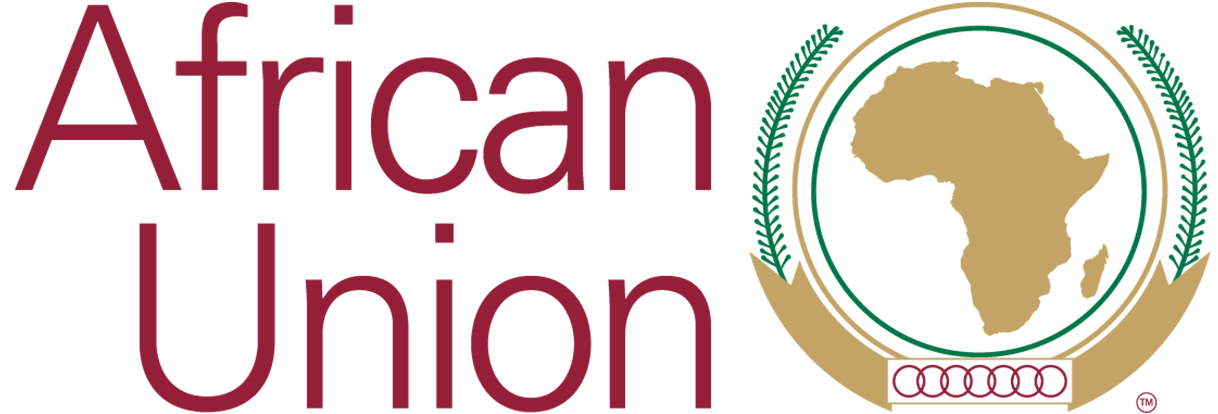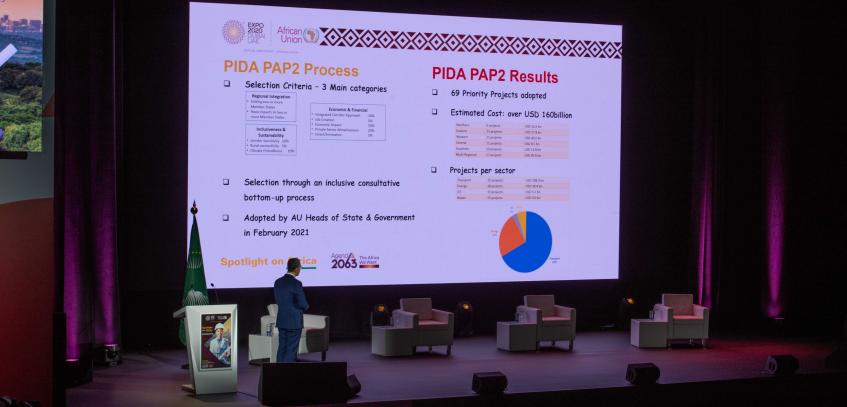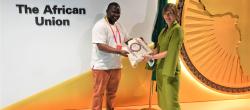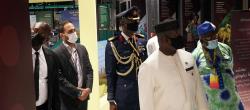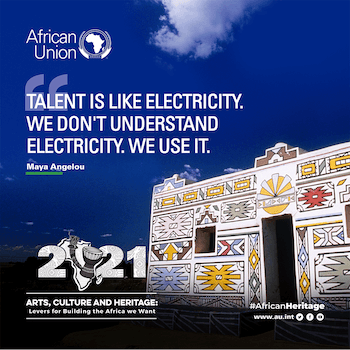The second Spotlight on Africa event, under the Infrastructure development theme, as organised by the African Union at Expo 2020 Dubai in partnership with the government of the United Arab Emirates and other strategic AUC Partners, imparted some great lessons worth noting as Infrastructure Development and Energy continue to be the bedrock of the sustainable development of the African continent.
Guests, online and in-person had the honor of hearing from industry gurus and respected pioneers who are advancing the cause of profitable and sustainable development across the African continent. Thereby moving the continent’s integration agenda forward.
The hybrid event shed light on existing opportunities concerning infrastructure development in Africa, underscoring that Africa’s infrastructure and energy initiatives, and frameworks aim at closing the gaps that have dogged the continent for many years in a coordinated and harmonious way to generate wealth and restore dignity for millions of Africans that currently don’t have access to the kind of services and amenities that people elsewhere take for granted.
On day one of the Infrastructure Event, two high-level panels were held to popularise the recently adopted Second Phase of infrastructure Development in Africa (PIDA PAP2) and its priority projects and its promises for an adequate, cost-effective, and sustainable regional infrastructure development. The sessions demonstrated the 69 regional and trans-regional infrastructure projects that will be implemented until 2030 and brought to light the opportunities it presents for investment and public-private partnerships.
“The objective of regional integration is to facilitate movement of people, goods and services, a bottleneck in the realisation of Agenda 2063. Hence the corridor development is an integral part for regional integration and realising of the AfCFTA goals together with PIDA-PAP 2” explained AUDA-NEPAD’s Director of Programme Delivery and Coordination Directorate, Mr. Amine Adoum.
Mr. Adoum also expounded on the importance of other infrastructure sectors and the tools that have been developed to accelerate the implementation of continental and regional projects.
“Energy corridors are also important hence we are working towards implementing the Continental Power System Master Plan. Three tools that have been developed to accelerate infrastructure projects rollout are: the Service Delivery Mechanism, the Continental Business Network (validated by the African Union), and the publishing of de-risking infrastructure projects in Africa reports,” he declared.
PIDA PAP2 projects have an estimated cost of 161 billion USD - packaged to promote an Integrated Corridor Approach, where infrastructure corridors complement each other paving the way for free movement of people and goods in Africa while enhancing Intra African trade, job creation, and industrialization.
Acting Director of Infrastructure and Energy Department at the AUC, Mr. Atef Marzouk called on financiers to look into investment opportunities that PIDA PAP2 avails. He said, 16 billion USD is needed every year to realize PIDA-PAP2 and ways need to be explored to fill this financing gap through enhanced partnerships.
The African Union Development Agency (AUDA-NEPAD) Programmes Delivery and Coordination Director, Mr. Amine Idriss said PIDA PAP2 has taken important lessons from its predecessor. As opposed to PIDA PAP2, PIDA PAP1 had more than 400 projects at different levels of implementation.
“Most of those projects were long-term projects and are still under implementation. Many of them have been fully implemented, especially the transport and the road & railway and some are still at the level of project structuring or tendering. And that's what helped us to define precisely what PIDA PAP2 should look like and how we should continue to drive the infrastructure development.”
Dr. Robert Lisinge, Chief of Energy, Infrastructure and Services Section with the United Nations Economic Commission for Africa (UNECA), believes Africa is well prepared to attract investment with the existing policy and regulatory frameworks as well as other transcending opportunities that correspond to Africa’s infrastructure development ambitions such as the African Continental Free Trade Area (AfCFTA) which provides a huge opportunity for investment in infrastructure.
The session on the African Energy Transition Program has presented the African Single Electricity Market (AFSEM) and discussed what has been envisaged to transform Africa’s energy sector. Executive Director of the African Energy Commission (AFREC) Rashid Ali said, despite the abundant energy potential that Africa is blessed with, its electricity provision didn’t exceed 50 percent with high regional disparity.
Mr. Marzouk highlighted the opportunities that lie ahead in terms of reversing this trend. He brought the recently adopted Single African Electricity Market (AfSEM) on board as an initiative to revamp access to reliable, affordable, and sustainable energy access for 1.3 billion Africans.
Believed to be the largest single electricity market globally AfSEM aspires to be fully operational by 2040 while its first phase is expected to be realised by 2023. Implementation has commenced this year after its official launch in June 2021 supported by the Continental Power System Masterplan developed by the African Union Development Agency (AUDA-NEPAD).
There was also a call of continued unity from the expert panelists, stating that African Union Member states and regional institutions need to harmonise their energy strategies for a seamless energy sector development as well as diversification of its energy resources.
Leading panelists from the African aviation and air transport industry were also present to discuss the set of circumstances regarding the implementation of the Single African Air Transport Market (SAATM).
Launched in 2018, SAATM is a flagship project of the African Union’s Agenda 2063 and is one of the key priority projects under the PIDA PAP2 that aspires to create a single unified air transport market in Africa to advance the liberalization of air transport services.
SAATM will ensure that aviation plays a major role in connecting Africa, promoting its social, economic, and political integration, and boosting intra-Africa trade and tourism as a result. So far, 35 AU member States representing 89% of the existing aviation market in Africa and 60% of the African population have joined the SAATM.
A call was made to African Member States, African airlines, and other industry players to explore the huge benefits offered by the SAATM to support a safe and efficient air transport industry in Africa.
Likewise, the session on the Digital Transformation Strategy (DTS) for Africa has highlighted the path Africa will take towards harnessing digital technologies and innovation to transform African societies and economies in line with Agenda 2063 aspirations. Digital transformation has been depicted as a critical component to unlock Africa’s full potential and enhance investments in the sector.
Head of economic integration division with the African Union Development Agency (AUDA-NEPAD) Dr. Towela Jere, says Africa needs digital solutions that suit the context of Africa, and a digital solution that particularly embraces rural Africans is imperative if Africa is to make the best out of the digitalization. The Digital Transformation Strategy (2020-2030) is the blueprint and master plan that will guide a common and coordinated digitalization agenda for the next decade to enhance synergies among a wide range of implementing partners.
The African Integrated High-Speed Rail Network (AIHSRN), a flagship project spirited by the African Union as part of the continental agenda 2063 has also been among the discussion points at the Spotlight Africa Infrastructure Development Event.
This final session probed into the current state of the Network eight years after its adoption with a particular emphasis on what has been done in terms of the interoperability and policy measures to promote and revive the African railway Network. Technical specifications on the interoperability as well as financial facilities and collaboration models among countries have been discussed while stakeholders were invited to comply with the existing frameworks.
All six plenary sessions highlighted the groundwork already covered whilst also looking into the modification of policies as well as the continued commitment of African Union member states to the cause of a sustainably developed African continent. In the end, leaving all and sundry with the realisation, that indeed, Africa well prepared for Infrastructure Investment with the right instruments in place to unleashing opportunities.
The public, media and all other interested parties can keep up-to-date with the latest out of Dubai as well as get all the necessary information surrounding the AUC lead activities/events by visiting the official AU at Expo 2020 website: https://africaexpo2020dubai.au.int/en
For further information please contact:
Mr. Lunga Kupiso, Public Relations & Media Officer - AUC at Expo 2020 | Information and Communication Directorate | African Union Commission Tel: +251 115 517 700 | E-mail: auexpomedia@africa-union.org | Addis Ababa, Ethiopia
Ms. Faith Adhiambo, Media & Communications Coordinator - AUC at Expo 2020 | Information and Communication Directorate | African Union Commission Tel: +251 115 517 700 | E-mail: ochiengj@african-union.org | Addis Ababa, Ethiopia
Information and Communication Directorate, African Union Commission I E-mail: DIC@africa-union.org Web: au.int | Addis Ababa, Ethiopia | Follow Us: Facebook | Twitter | Instagram | YouTube

